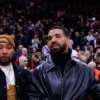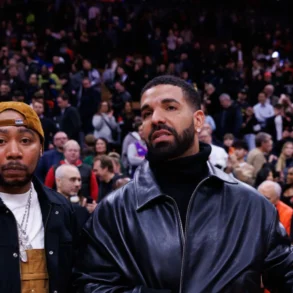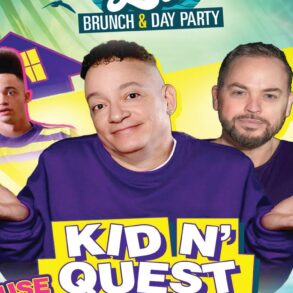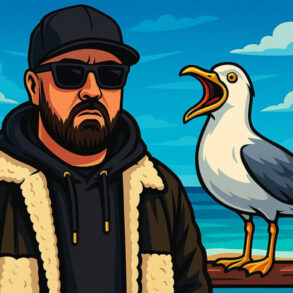This year is a big one for Loco Dice. His new album, Purple Jam, just landed and it carries no shortage of significance for the Düsseldorff-based DJ and producer. Echoes of hip-hop have always been present in his music, even if just in his approach, but with Purple Jam its presence is felt more than ever. Of course, house and hip-hop’s relationship is nothing new: the club scene in 1980s Black America saw the two worlds collide, each genre borrowing from one another.
Loco Dice’s own roots in hip-hop date back to the early ’90s scene in Germany and, in the years since, he has stayed tapped in—he had the Landlord himself, Giggs, on a track (and on stage) a whole decade ago—and the Purple Jam tracklist boasts a stack of big names from the modern-day frontline. We’ve already had a collab with Trinidad James (“Juice”, alongside The Martinez Brothers) and there’s more besides. “Road Runner” with Carl Cox, another album extract revealed back in February, fused their peak-time Ibiza-ready sound with punchy D&B breaks. Meanwhile, the project’s lead single, “Heavy Heart”, sees him connect with Afrobeats star Fireboy DML and another producer who has been on a similar journey straddling the dual worlds of big-room rave and underground MC culture: Skrillex.
Those are the headline collabs for the international press, but the best illustration of my point comes in “Ice Cold Dealer”. Released a couple of weeks after “Road Runner”, the snappy, foot-tapping club burner is built around a Biggie sample and features legendary German rhymer Haftbefhel, an artist whose German rap roots run almost as deep as Loco Dice’s. Does this mean a sidestep into rap? Far from it, apparently. Don’t be surprised if you see some of the featured artists brought out next time Loco Dice hits the rave, but the strength of these tracks is their versatility. You will no doubt hear all of these stirred into his dancefloor sound in the coming weeks and months, but these are ultimately another dimension to the heady Loco Dice stew.
We caught up with him to find out more.
COMPLEX: Congrats on the release of your new album, Purple Jam. It’s a superb listen. How would you say this album differs from your previous releases?
Loco Dice: Thank you! It’s very different from the others; it’s more like a real album format. These days, albums are more like playlists. Even the approach to Purple Jam was completely different. I wasn’t planning to release any albums anymore because I didn’t have the drive for it and I didn’t have the right idea, or the story. So what was in my mind was like, “Okay, I want to do music, but I want to make music that I would play as a DJ.” Everything needed to be done with the idea in mind that I could play it whenever. Back in the day, when I used to do an album, I never thought about whether or not I could play it whenever. It was just, “Let’s create music and see what the process brings me.” So you would have an album with tracks that you could just listen to or tracks which you could play in the after-party. With Purple Jam, I wanted to make music and then, afterwards, when it came to sorting the music and labelling the music, I found that an album was coming together of tracks that worked no matter what time it was in the club.
Why the colour purple? What’s the significance of that?
When I DJ, I categorise my crates by colours. Red is peak time, green is more driving club tracks, and purple stands for vocal tracks. I don’t know why, but purple ended up being the one which had the most tracks that were playable at any time. That’s how it came together.
We’ve already heard collaborations with Carl Cox and Haftbefehl, The Martinez Brothers and Trinidad James, and there’s another with Gue Pequeno coming up. There’s a lot of hip-hop on there, isn’t there?
Yeah, and that’s because I’m from hip-hop. I was a rapper, DJ, and dancer. I was completely in the hip-hop movement in the early ‘90s in Germany. It never left me, actually. There were times where I hated hip-hop and, for a while, I never wanted to go back. But when you grow up with something and you’re in a culture, it never lets you go. It’s in my blood. There was a time where hip-hop was also not in a very good state. After the death of Biggie and 2Pac, the music turned very poppy. It was accessible to everyone. It wasn’t special anymore. That was when I discovered electronic music, but hip-hop is still very much in me: the way I produce, the way I DJ—it’s still hip-hop. Hip-hop heads will notice that, but if you’re not in hip-hop, you might not notice it.
This album has the most overt references to that world. What made you think more about hip-hop when you were creating this album than, say, previous releases?
The thing is that when I got the tracks finished, I never had a feature in the head. The features came later, once I realised I had a potential album on my hands. Then I started making a list of artists who are close to me and whom I’ve always wanted to work with. It all came together very easily. They were all people I had existing relationships with so it was all very organic.
Were you consciously thinking about your early days as a hip-hop DJ in Düsseldorf when you were making the album?
I still live in Düsseldorff. Driving around, going to the gym, I see my old neighbourhood—it’s still a part of me. I wouldn’t say I was consciously thinking about those days, but it’s an infusion which is constantly there. My approach is always from a hip-hop perspective because that’s my background. When you see me at festivals, you’ll see me going straight to the hip hop stage. It’s just inside me.
Speaking of festivals, are you taking this album out on tour and would you be bringing the featured artists with you?
Bringing the featured artists would be very, very difficult. It was difficult enough to record with them, getting everyone’s schedules lined up. But the plan is there. Like with Skrillex, we are looking for something special to do together or combine other artists I’m really impressed with, but it’s very difficult, especially when you see the feature list that I have. They’re not just no names—they are big artists! Everybody’s a heavyweight. Bringing this together on stage would be a bigger mission than producing the album.
Yeah, that’s fair.
I don’t want to stress myself. There will be times, there will be festivals where things happen, where we’re all together. But the plans are there, of course. It’s why we produced the tracks… We’ll see.
Do you see the shows taking a different format?
No. Because when you come to a Loco Dice show, you always have that sort of thing. You always had a hip-hop guy showing up out of nowhere. I always love to bring these things together. Since my early days with Underground Sound Suicide, where I had Giggs on the album and I brought him out at Hideout in Croatia, the time wasn’t right in that time, but people were shocked. Social media was on it! It was way before Giggs was a superstar. I always do things like that, but it needs to fit.
It’s funny that you mentioned Giggs, because there’s a lot of crossover in the UK with rap and grime guys who are also big house heads—like Skepta and Jammer, for example. Have you worked with anyone else in the scene?
No, not really. A lot of the artists that I chose aren’t really mainstream artists. Guys like Haftbefehl or Giggs, these guys are no joke. This was the most important thing for me. Haftbefehl talks about what I know, and it’s the same with Giggs when he talks about Peckham. That’s how I grew up. Trinidad James, on the other hand, is completely something else. He’s a U.S. rapper and I love his way of rapping and style. He was so different that I had to have him on a track.
I’m assuming you’ll be in Ibiza this year. Have you noticed a shift in the overlap between hip-hop and dance music in Ibiza lately?
It used to be more like that. In the late ‘90s, you’d have MTV doing a party, Room 1 would be the big room, and then the small room would be hip-hop. That was the room I used to play in. So it was always there, but now the music has come together a lot more. The new generation doesn’t separate that much anymore. I remember when I started to put hip-hop vocals in my sets, people were looking at me weird, like: “What the fuck? Why are you doing this now?” A lot of people looked down on techno at the time, but times change. People look to hip-hop for credibility now. Pop artists, EDM artists, they always want that coolness by having a rapper on the track.
The hip-hop guys, they see it as a business. “Give me the cheque, I’m there, bro, no matter what it is.” If David Guetta calls you, you answer the call because he’ll push you into new genres and help you reach new people. It’s all good for business. But most of these people, I’m pretty sure, are not celebrating this music. They’re not partying to this music because I don’t see them at the parties. But you have other artists that you see constantly at parties who are into electronic music. They understand what is underground, what is house, what is techno, what is EDM. You know what I mean? They care, and it works. Coming back to what Ibiza is like, Ibiza is constantly changing, constantly evolving. It goes with the music industry. A lot of people are very nostalgic, very back in the day, but Ibiza has always changed. The only major change is that Ibiza has no underground music anymore. If it does, it’s only in certain, very small places. Ibiza became a proper business with all these clubs, all these artists, all these DJs. Back in the day, it was very difficult to play in Ibiza. It was also difficult to release a track or to be on a label. These days, in a second, you can be a superstar. So that’s just the times we live in. We have to move with it.
That’s really interesting. I want to talk about your label quickly—what have you got planned for Desolat this year?
I have two labels now: I have Desolat and SB Recordings. SB Recordings is more for experimental stuff, but it could also have a hip-hop release. That label is like my playground where I can release anything. My name, Loco Dice, doesn’t come from nowhere. People see me sometimes dropping weird records and weird genres—it could be a dubstep record, it could be something else over there, but that’s what I’m about. SB combines my whole world of influences and is more in-tune with whatever bubble I’m in at that time. Desolat, on the other hand, is more of a constant. It’s a club, on-the-ground label. The next releases on Desolat will be by an artist from Cologne, a German artist, called Chris De Perri. And after that, we have a guy from Serbia called Minne. He’s an amazing producer.
Do you see yourself exploring other mediums, other sounds, formats, media? TV and film soundtracks, maybe?
I don’t know. If somebody comes to me and gives me the right opportunity, I could do that. Back in the day, I worked for Marcelo Burlon for his catwalk in Milan. I made all the music, the whole show, which was amazing. It was so much fun to create. So yeah, I could see myself doing stuff like this, but it needs to be the right project and the right approach. But me by myself, trying to push myself into something? No, I’m just a DJ, a producer—I make my music and I play it. Like I say, it has to be natural. Forcing things always goes wrong. The only thing I can tell you, and this is something I’ve been working on for so many years, is my FKD collaboration with my partner Friszo. We’ve been working on that for so many years and we still haven’t figured out what it sounds like. It’s a hybrid between hip-hop and electronic music, but very experimental, I would say. That’s where my head’s at. Watch this space.
This post was originally published on this site be sure to check out more of their content.






